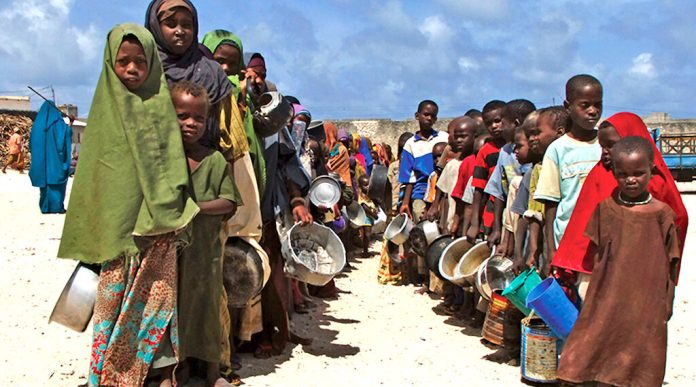A new data analysis by a humanitarian organisation, Save the Children, ahead of the 2023 United Nations Climate Change Conference or Conference of the Parties [COP] showed that more than 27 million children were driven into hunger and malnutrition by extreme weather events in countries heavily impacted by the climate crisis in 2022, which was a 135 per cent jump from the previous year.
This was disclosed in a press statement by Save the Children on Tuesday.
Save the Children found that children made up nearly half of the 57 million people pushed into crisis levels of acute food insecurity or worse across 12 countries because of extreme weather events in 2022.
This was based on data from the Integrated Food Security Classification or IPC scale, a monitoring system for assessing hunger emergencies in 58 countries.
The IPC has estimated that the number of people facing hunger in countries where extreme weather events were the main driver of food crises has nearly doubled in five years – soaring to 57 million in 2022 from about 29 million people in 2018.
The majority of countries where weather extremes were the main driver of hunger last year were concentrated in the Horn of Africa, with Ethiopia and Somalia accounting for about half of the 27 million children.
The 12 countries where weather extremes were the primary driver of hunger in 2022, according to the IPC, were Angola, Burundi, Ethiopia, Iraq, Kenya, Madagascar, Malawi, Pakistan, Somalia, Tanzania, Uganda, and Zambia.
“Somalia has been repeatedly at the frontlines of the climate crisis, suffering five failed consecutive rainy seasons. Now, the country stands once again at the precipice, with extreme weather events such as mass flooding set to exacerbate hunger this year.
“Heavy rains and floods in recent weeks have displaced about 650,000 people — about half are children — cutting families off from accessing food and medical care. The current flooding could be just as devastating for the country as the years of drought that left millions of children hungry and malnourished,” the statement read in part.
The organisation said Pakistan was one of the countries where extreme weather events were the primary driver of hunger last year after devastating flooding submerged one third of the country, affecting 33 million people, half of whom were children.
It said one year on, more than two million flood-affected children are acutely malnourished, with almost 600,000 children suffering from the deadliest form of malnutrition.
“Annually, conflicts and economic shocks push even more children into hunger than weather extremes. Conflict was the primary driver of hunger for 117 million people in 19 countries last year. IPC data also revealed an eight-fold increase in the number of people facing hunger because of economic shocks in five years, jumping to about 84 million people in 2022 from 10 million in 2018.
“Globally, an estimated 774 million children — or one third of the world’s child population – are living with the dual impacts of poverty and high climate risk, according to Save the Children’s report – Born into the Climate Crisis.
“Last year, Save the Children found that 83% of children in 15 countries reported witnessing climate change or inequality, or both, affecting the world around them. Yet, children’s rights are neglected in climate finance. Currently 2.4% of climate finance from four key global climate funds can be classified as sufficiently considering children, although some funders like the Green Climate Fund are actively working to bridge these gaps.
“Save the Children is calling on world leaders at COP28, particularly those from high-income countries and historical emitters, to take action on the climate crisis by recognising children as key agents of change. Climate finance must be increased, providing funding for losses and damages and climate adaptation. Governments must work to urgently limit warming temperatures to 1.5C above pre-industrial levels.” it added.
The child rights organisation is also calling on leaders to address the root causes of acute food and nutrition insecurity such as conflict, inequality, and a lack of resilient health, nutrition and social protection systems.


